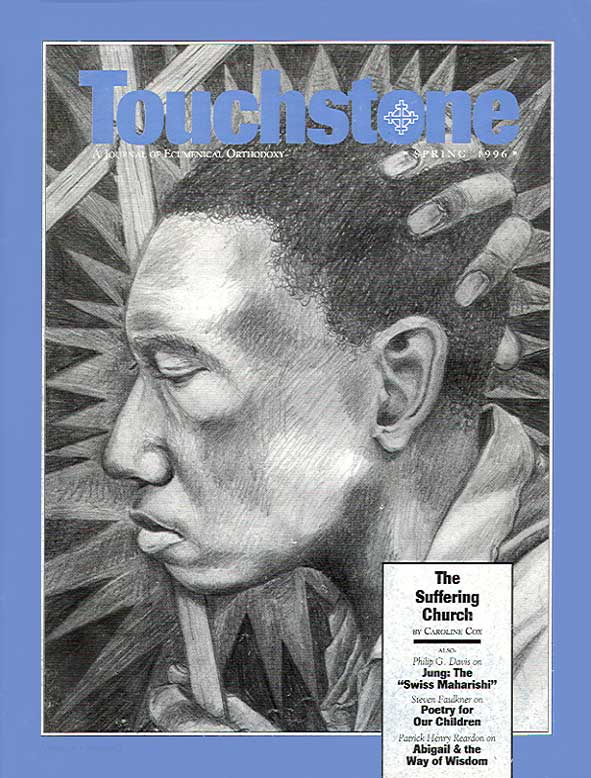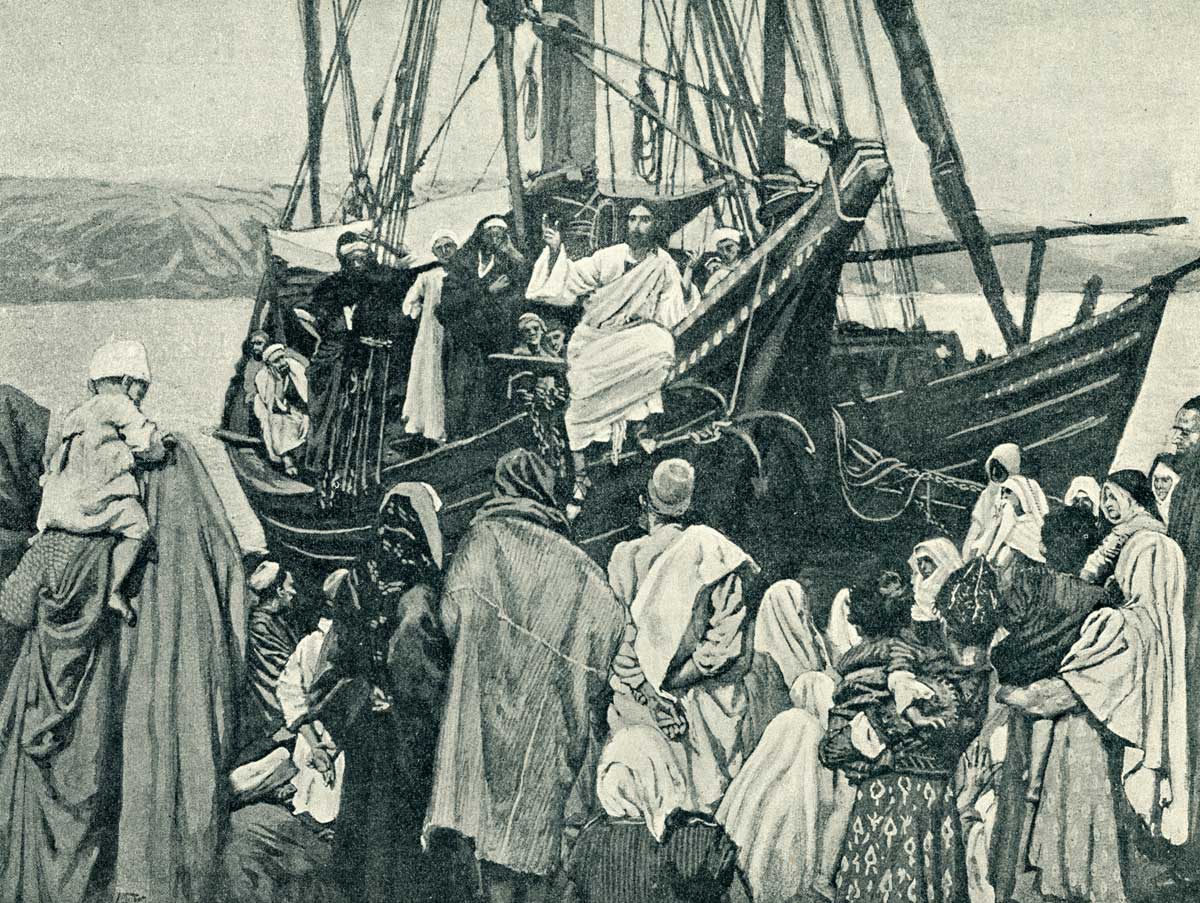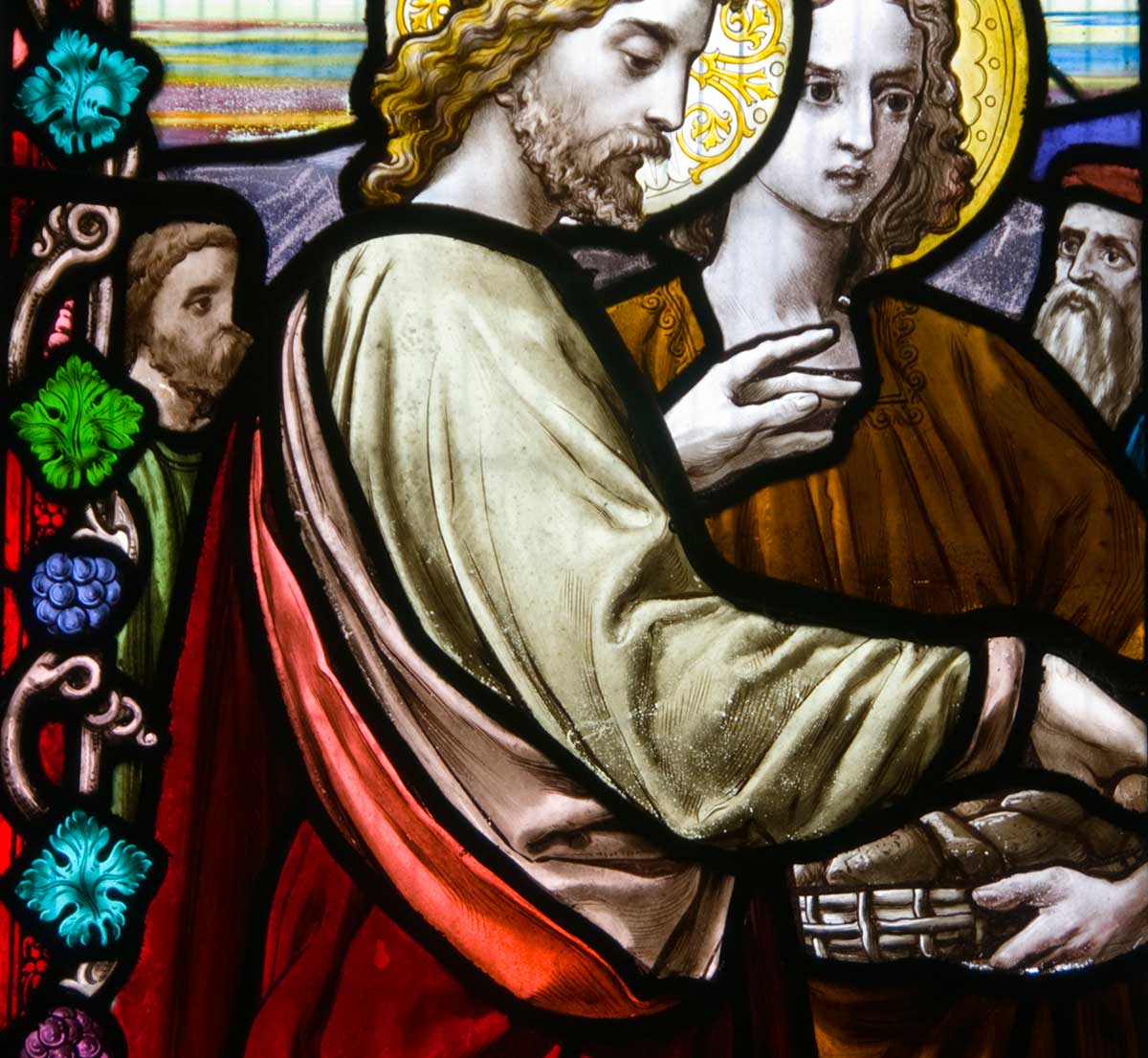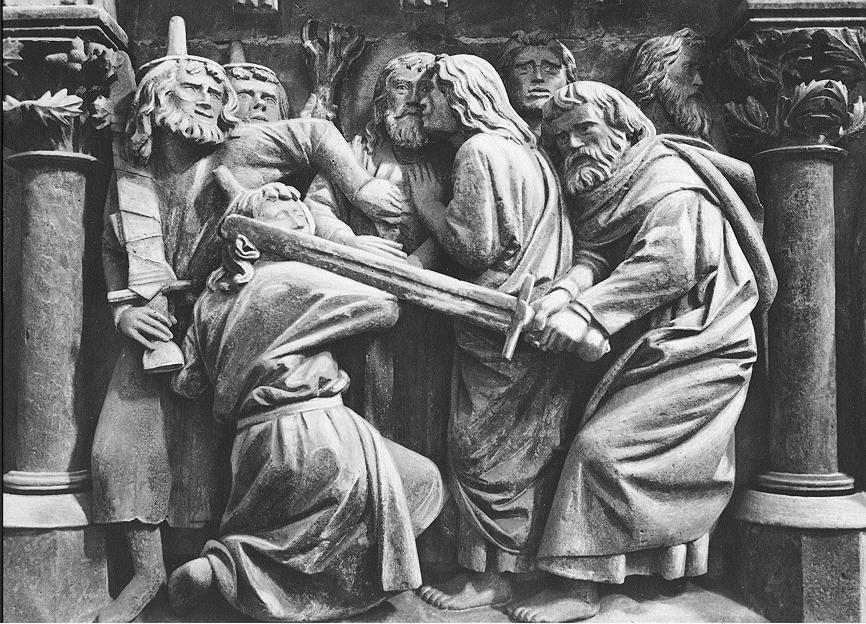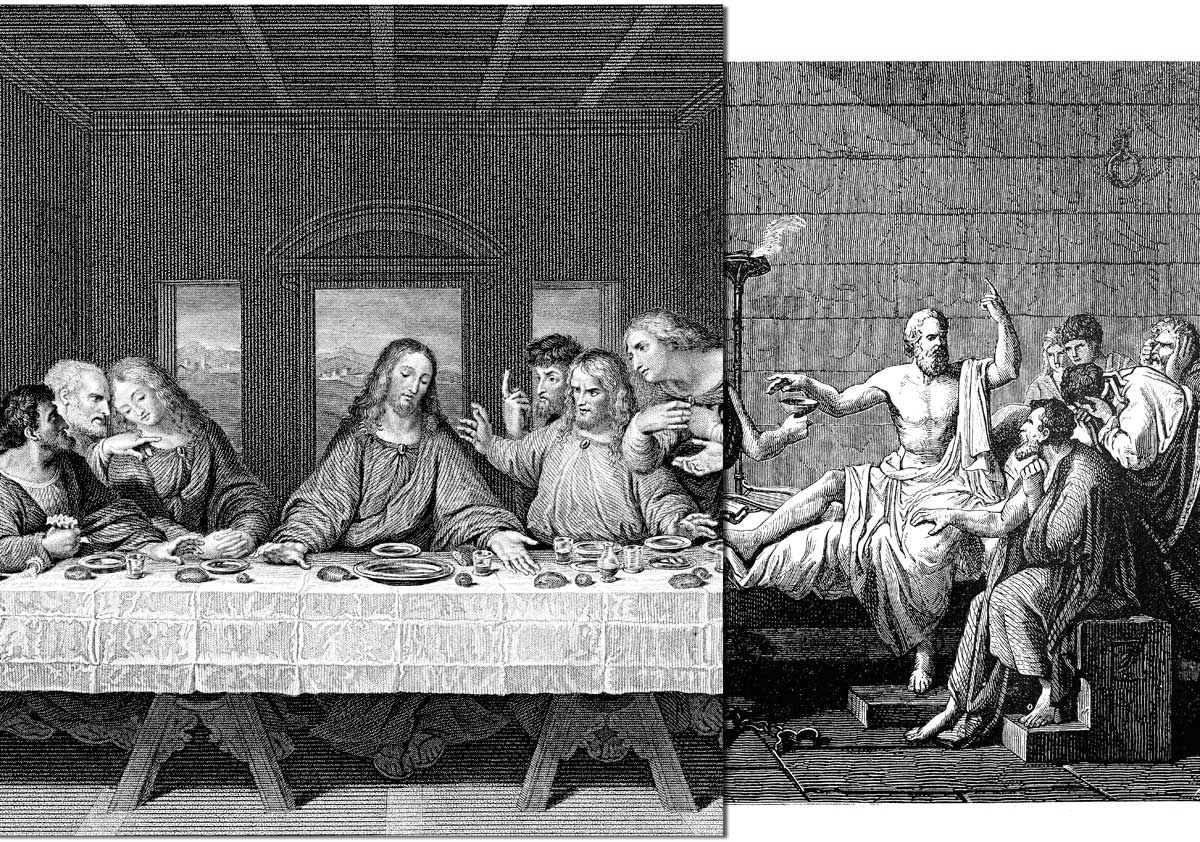Abigail & the Way of Wisdom
The Bible’s Narrative & Wisdom Traditions Are Combined in a Story of Romance
by Patrick Henry Reardon
In 1 Samuel 25, at a point roughly halfway through the description of David’s exile, comes the endearing account of his meeting with Abigail and of their eventual marriage.1 Reckoned among the most winsome narratives in the Bible, it is a story interesting, and even intriguing, from several aspects.
For example, 1 Samuel 25 has considerable merit just as a romance. And as a romance it is necessarily constructed with three major characters: king, queen, and knave. Since love without struggle is cloying, and struggle without love is cruel, a good romance invariably involves more than a couple falling in love. There must also be some sort of antagonist.2 A knight, a damsel, and a dragon, then, are all de rigeur, however they are named (Tom Sawyer, Becky Thatcher, and Injun Joe, for instance). In our story they are called David, Abigail, and Nabal.
First Samuel 25 also is interesting as a psychological study. Nabal, failing to understand either Abigail or David, is thereby brought to his ruin. David, by contrast, who is normally portrayed as a man gifted with insight into the character of other people,3 immediately perceives the inner worth of Abigail. She, quite unlike her husband, seems to understand the personality of David exactly and is able to appeal to his deeper, nobler dimensions.
I believe, however, that the principal interest of the biblical author himself is properly theological, and that it is particularly directed to two related aspects of salvation history: Wisdom and Providence. This captivating story of David, Abigail, and Nabal examines these two theological concerns. I will concentrate attention on Abigail, the central and dominant persona dramatis of 1 Samuel 25.
Abigail & the Fool
Even though she will not become an active participant in the drama until verse 14, Abigail is immediately introduced with her husband, Nabal, near the beginning of the account. This stylistic arrangement allows the author to establish early what becomes a sustained contrast between the two characters throughout the story. Abigail is “a woman of good understanding and lovely appearance,” whereas her “husband was surly and of evil deeds.” The rest of the account, elaborating the differences between a wise, attractive woman and her sottish, offensive husband, thus becomes a narrative enactment of the tension between Wisdom and the Fool, a standard theme of the Bible’s sapiential literature.
Nabal was by blood a descendant of Caleb, a name that means “dog,” 4 but he was certainly not a lazy fellow. Indeed, the evidence suggests something of a workaholic. He was a wealthy man who labored hard for everything that he possessed.5 A person of sharp tongue and mongrel disposition, Nabal was rash,6 compulsively driven, hot-tempered, stubborn, stingy, impossible to reason with, and a very slow learner. Abigail’s husband thus combined many of the features that the Wisdom tradition ascribed to the Fool. He also had a drinking problem and probably high blood pressure; he died of an apparent stroke. If Nabal was possessed of any good points, Holy Scripture neglected to mention them.
A major feature of Nabal’s moral imbecility was the failure to appreciate his wife’s wisdom. Long habituated to ignoring her example and her counsel, he followed his own path to self-destruction. His household servants summed it up: “He is such a wicked man that no one can talk to him” (1 Samuel 25:17).
There may have been an even more unattractive side to his personality, however. Commenting that her husband’s (Phoenician) name, Nabal, was identical to a Hebrew word for “fool,” Abigail went on to remark that “folly is with him” (1 Samuel 25:25). Her word for “folly” in this passage, nebalah, gives further pause for darker thoughts. First, of the various Hebrew terms for “folly,” this is the one likely to be used for notorious disgrace and public scandal (cf. Josuah 7:15; Isaiah 9:16 [17]; 32:6). Nebalah is not an abstract or general term; it invariably refers to individual actions and specific shameful situations. Except for Job 42:8 it does not appear in the Bible’s sapiential literature.
Second and more seriously, of the 13 times that nebalah is used in the Hebrew Scriptures, eight clearly refer to some form of sexual offense: fornication (Deuteronomy 22:21), adultery (Jeremiah 29:23), rape (Genesis 34:7), incestuous rape (2 Samuel 13:12), attempted homosexual rape (Judges 19:23f.), and rape unto death (Judges 20:6,10). Thus, in describing the “folly” of her husband, Abigail uses a word that, in a majority of cases, refers to something sexual, even involving violence. To be sure, sexual aberration is only faintly suggested in our text, but it does seem to be suggested. We observe, moreover, that the marriage of Nabal and Abigail apparently produced no children, though Abigail was certainly able to conceive (cf. 2 Samuel 3:3; 1 Chronicles 3:1). These details point toward yet another somber tone in Abigail’s shadowy marriage to this “rich man” of Maon.
Notwithstanding the conditions of that marriage, however, Abigail is not a woman to agonize over her fate. She is no hand-wringer. On the contrary, she is the very embodiment of the resourceful, energetic and “valiant wife” described in Proverbs 31:10–31: loving and patient, disciplined, hardworking and efficiently organized, wise and discerning, endowed with a gentle disposition and pleasant speech. Abigail’s household is so well ordered that, with no prior notice, she can promptly put together an enormous meal (including 200 loaves of bread) to feed David’s entire army (1 Samuel 25:18). A woman of great practical insight, she acts with dispatch; three times in the one chapter we are told that she “made haste.” The attentive reader gains the impression of a woman who decided, years ago, that her very survival would require an energetic but disciplined approach to life.
Abigail & Wisdom’s Test
To save her household, therefore, Abigail goes out to meet the outraged David. Sadly, David is not far behind Nabal in his rashness of temper. Vowing an exorbitant retaliation for Nabal’s arrogant affront, he too is on the point of playing the Fool (cf. Proverbs 14:17). But then Abigail, acting as David’s own personal Lady Wisdom, comes to seek him out,7 giving the “soft answer that turneth away wrath” (5:1), instructing him not to “answer a fool according to his folly, lest thou also be like unto him” (26:4). As the personification of Wisdom on David’s behalf, Abigail “has prepared her meat and mixed her wine; she has also set her table. She has sent out her maids, and she calls from the highest point of the city” (9:2f.).
In his hour of impending moral peril, then, David’s deliverance comes from receiving the instruction of Wisdom (Proverbs 15:32f.). He is thus rescued from an evil course of action that his anger had caused to seem proper (Proverbs 16:25; Ecclesiastes 7:9). The wise Abigail exhorts him to patience and restraint.8 She persuades him to abandon his foolish vow of blood-vengeance9 and to leave retribution to a provident God.
Thus rescued from the edge of destruction, David recognizes and praises Abigail as a woman of sense and discretion. The ultimate, decisive difference between David and Nabal is that the one will listen to Abigail’s exhortation and the other will not. The wise man gladly receives instruction and reproof; the fool does not.
Wisdom & the Providence of God
The story of Abigail and David also exemplifies another major literary and theological motif of 1 Samuel: the historical working out of God’s messianic purpose, his plan to bring David to the throne of Israel. Indeed, this is the principal and unifying topic of the whole book, introduced early in the canticle of Hannah: God “will give strength to his king, and exalt the horn of his anointed” (2:10). The provident Lord has determined that David will be the founder of the chosen dynasty. The dominant theme of 1 Samuel, then, is God’s Wisdom hidden in the messianic mystery.
In directing the events of history to accomplish this established purpose, however, 1 Samuel shows Divine Providence acting in a purely “secular” way. That is to say, the intricately connected events follow one another as seemingly normal sequences. There are no visible, extraordinary divine encroachments, as it were. First Samuel is not strong on overt miracles. Whatever God does here, he does secretly and from within the dynamics of human activity. The Lord is not portrayed as invading the sphere of human activity in a manifestly disruptive way. Rather, he directs the course of events by means of human decisions and actions.
Nonetheless, God is at work in the story, and things do happen on schedule. God is “with” David (1 Samuel 16:18;17:37;20:13). David kills the lion and the bear (17:36), but it is the Lord who grants him the victory (17:37). Saul’s deep depression, which leads gradually to his own downfall and David’s rise, comes from the Lord (16:14;18:10). Nor does that smooth stone from the sling miss the brow of the giant, for it is the Lord who delivers Goliath into the hand of David (17:37,45–47).10 On the other hand, Saul’s impulsive spear repeatedly strays wide of the mark, while David escapes unharmed (18:11;19:10).
To preserve David and eventually bring him to the throne, God employs the decisions and actions of many persons: Michal (19:11–16), Jonathan (20:1–43), the priests of Nob (21:1–9), the Philistines (19:10–15), the Moabites (22:3f.), an oracle at Keilah (23:9–13), and informers at Horesh (23:15). Still, it is ever God who mysteriously directs the events, and the elder David will later look back to praise his Divine Rescuer (2 Samuel 22:1,18; Psalms 17[18]:7).
This theme of God’s deliverance of David is particularly emphasized in the immediate context of the story of Abigail in chapter 25. The latter narrative is sandwiched between two very close encounters of David with Saul, in each of which David is providentially positioned to do harm to the king but patiently forbears. In the first of these stories, in 1 Samuel 24, David gets close enough to Saul to cut off the edge of his garment without being detected. He refrains from harming Saul, however, deliberately leaving all retribution to God (cf. especially verse 12).
In the other story, in 1 Samuel 26, David is able to creep through the enemy camp right up to Saul’s head in the dead of night, because “a deep sleep from the Lord descended on them all” (verse 12).11 Once again, though, David refuses to inflict retaliation on Saul, leaving his cause entirely in God’s hands (cf. verse 24).
Strategically placed between these two stories of David’s patience and restraint with Saul, comes the account of his terrible impatience and planned revenge with Nabal. In this case too, David is once again delivered, not this time from a physical danger, but from an even deadlier moral peril. His providential rescuer on this occasion is Abigail, the discerning and beautiful woman who comes to redirect him to the path of patience and trust in God.
Just as Abigail is the representative of Wisdom here, she also is the instrument of Providence. Her intervention is the Lord’s means of preserving David’s moral integrity. Both characters recognize this fact, for Abigail tells him: “The Lord has kept you from bloodshed” (1 Samuel 25:26), and David himself confesses to her that the Lord “sent you today to meet me” (25:32). Divine Wisdom thus gives both of them insight into Divine Providence.
As the discerner of both Wisdom and Providence, moreover, Abigail serves here in a prophetic role.12 She perceives God’s true purpose in history, foretelling David’s ascent to the throne and the founding of his dynasty: “The Lord will certainly make a lasting house for my master” (1 Samuel 25:28; see also v. 30).13 She asks for herself only to be “remembered” by David (25:31), a modest petition that is providentially granted in the marriage that ends this lovely story with both irony and extravagance.14
Abigail in the Church
Christians have approached the account of Abigail from various directions. Some early readers, for example, perceived a special and mysterious meaning in her very name. Probably following the lead of Eusebius’s Onomasticon, Jerome accurately discerned that the two Hebrew root words in “Abigail” are ab, “father,” and gil, “to rejoice.” Putting these together he arrived at the rendering “father of rejoicing.”15 His medieval Latin followers, however, settled for something along the more comfortable and sonorous lines of “the rejoicing of my father”; they adjusted their exegesis accordingly. It was not difficult to see, after all, that our heavenly Father would rejoice in the likes of Abigail.16
Nor is it surprising that some Christians should have seen Abigail as a “type” or symbol of the Church. She was, after all, the wife of the anointed David, whom Christians since New Testament times have regarded as a figure and foreshadowing of Jesus the Messiah. Moreover, Abigail was the “more loved” of David’s wives.17 So to Ambrose of Milan, for example, it seemed very natural to view the marriage of David and Abigail as a striking symbol of the union of Christ and the Church.18 Some later Latin exegetes followed Ambrose’s suggestion with enthusiasm, going on to interpret the sundry details of 1 Samuel 25 with robust, if not always convincing, imagination.19
Nonetheless, I do not think that such an approach is truly representative of the way Christians generally have read the Abigail account. She never really “caught on” as a type of the Church, it seems to me, and I suggest that several reasons would explain this.
First, even as a wife of David, Abigail was not—pace Gregory of Nyssa—the “mother of kings.” She did not become the gebirah, “the Lady,” the official title of the queen mother.20 Her blood does not enter the royal line at all. In a sense, her story is a single step in the dramatic movement of 1 Samuel and hardly more than a fleeting scene in the biblical narrative as a whole. Unlike Sarah, Rebecca, Leah, Rahab, Ruth, and the “queen mothers” of Judah (all of whom the Books of Kings are careful to name), Abigail is not a biological part of the messianic sequence. Nor is her place in the biblical narrative otherwise sufficiently central to make her a major figure in Church typology later on.
Second, engaging and unforgettable as Abigail appears in 1 Samuel 25, Holy Scripture says quite a bit less about her than it does about quite a number of other women. Her appearance is relatively brief.
Finally, the polygamous context of the account in 1 Samuel 25 puts excessive strain on any sustained attempt to think of the marriage of David and Abigail as a symbol of the union between Christ and the Church. Notwithstanding its adoption by such exegetical giants as Ambrose and Gregory of Nyssa, the theme did not generally prevail in early Christian readings of the story. The great mystic symbolism of marriage outlined in Ephesians 5 presupposes a setting of monogamy, or it otherwise tends to unravel. Polygamy makes tough going for poetry, and Abigail was never David’s “one and only.”
The Traditional View
I have tried to suggest that the best way to pursue the narrative of Abigail is through the Bible’s twin teachings on Providence and Wisdom. Studied simply as components found in the plain meaning of the text, these are the two streams that join the Abigail narrative to deeper springs of Holy Scripture.
This approach to Abigail, however, is hardly new. Indeed, for many centuries her story has been studied by Christians with precisely these two ideas in mind.
First, Divine Providence. Jerome observed that her wise and prompt intervention preserved David from doing what he would later have had to repent of and weep over.21 In truth, however, wrote Procopius of Gaza, when David listened to the counsel of Abigail, he was “prevented by the Providence of God” (pronoia tou Theou) from committing such a sin.22 Moreover, according to Theodoret of Cyr, “divine foresight” (theia prometheia) was just as much involved in the ensuing death of Nabal as it was in the “deep sleep” that overcame the army of Saul in the next chapter.23
Second, moral wisdom. Unlike her foolish husband, Abigail treated David and his men with kindness. In so doing, she exemplified some of the works of mercy listed by Jesus in the Last Judgment scene of Matthew 25.24 Similarly, her turning back the wrath of David, thus keeping him from sin, makes her an outstanding model of prudence.25 Moreover, that same biblical scene also demonstrates a further dimension of her mercy and compassion: she pleads for the lives of innocent people whom David has in mind to kill, even to the point of placing herself at risk.26
Christian readers have noted that Abigail was particularly characterized by her wisdom in speech. More precisely, she knew exactly when to speak and when to be silent, and she discretely picked her occasions for each. In a passage destined to be quoted repeatedly throughout the Middle Ages, Gregory the Great drew attention to the fact that Abigail refrained from sharing with Nabal her view of the family’s dealings with David until her husband was sufficiently sober to grasp the significance of their household’s dangerous situation:
Wherefore, it was praiseworthy that Abigail did not speak to Nabal about his sin while he was intoxicated, and it was just as praiseworthy that she did tell him about it when he became sober. For it was precisely because he did not hear of his fault when he was drunk that he was afterwards able to recognize it.27
Gregory’s sensible and plain assessment of Abigail’s conduct in this instance was promptly taken up by his disciple Paterius and placed verbatim into a catena, or chain, of various Gregorian texts arranged as an ongoing biblical commentary.28 The great popularity of this latter work caused Gregory’s observation to become a true commonplace among medieval Latin exegetes whenever their discussion turned to the subject of Abigail.29
Wisdom in a Mystery
Abigail’s prudence was marked by both activity and insight. She was able both to remedy her family’s desperate situation and to discern the deeper purposes of God.30 Her active wisdom was at once moral and messianic. Thus, in a single course of action, she saved her household and effectively furthered God’s historic purpose with regard to his chosen king.
We Christians too believe that God’s wisdom is revealed in his messianic purpose, which the Apostle Paul calls “the wisdom of God in a mystery” (1 Corinthians 2:7). Flesh and blood, we are persuaded, cannot reveal to us (Matthew 16:17) this “manifold wisdom of God according to the eternal purpose which he purposed in Christ Jesus our Lord” (Ephesians 3:10f.). In this, God has “abounded toward us in all wisdom and prudence, having made known to us the mystery of his will” (1:8f.).
The wisdom that God shares with his people is the revelation, recognition, and confession of his Messiah, that we “might be filled with the knowledge of his will in all wisdom and spiritual understanding” (Colossians 1:9). Eternal salvation is promised to those who call upon the name of him who is at once David’s son and his Lord (Mark 12:37). Thus, the swift, prudent, and discerning Abigail serves as a proper model for those questioned from on high: “What think ye of the Christ? Whose son is he?”
Notes:
1. I cannot find this text prescribed in the Eucharistic lectionary of any Christian body. In both the Roman Catholic and Episcopal lectionaries for the Daily Office, however, the account is read every other summer, a practice maintained in the Devotional Guide published by the Fellowship of St. James.
2. In the Book of Tobit the antagonist is the demon Asmodeus, while the antagonist in the Book of Ruth (3:12f.; 4:1–8) is never named.
3. Thus, he understands Saul better than Jonathan does (1 Samuel 20:1–3), sees intuitively into Doeg the Edomite (22:22), early suspects the evil that Absalom is up to (2 Samuel 13:25f.), and quickly uncovers the actress sent to him by Joab (14:19).
4. That some uncomplimentary symbolism is intended by this reference was early recognized by the LXX’s translating it as “doggish man” ( anthropos kynikos). This variant rendering later led to Flavius Josephus’s imaginative assessment that Nabal conducted his life “out of a Cynic discipline” ( ek kynikes askeseos); cf. The Antiquities of the Jews 6.13.6. Salva reverentia (and, I suppose, cave canem), we also may note that the dog and the fool are paralleled in Proverbs 26:11.
5. Jerome likens Nabal to the rich fool in Luke 12:20; cf. his Epistolae 125:10 (PL 22.1078).
6. Cf. the comment on him by John Chrysostom, Homiliae in Philippenses 5 (PG 62.218).
7. Cf. Proverbs 1:20f.; 3:13–18; 4:6–9,13; 8:1–3,10f.
8. Compare 1 Samuel 25:26,30f. with Proverbs 19:11,20f.
9. The Church Fathers approved David’s abandonment of his rash vow; cf. Augustine, De Mendacio 9.21 (PL 40.531); John Cassian, Collationes 17.25 (PL 49.1079A). Origen believed that David’s minatory resolve in 1 Samuel 25:22 had never been directed against anyone but Nabal himself; Homiliai eis ta Biblia ton Basileion, Athens edition of the Greek Fathers, vol. 11, p. 239.
10. The single-handed combat between David and Goliath, especially the structural juxtaposition of battle with explanatory dialogue, readily puts one in mind of Homer, nor should we forget, in this connection, the probable Cretan origins of the Philistines. In the biblical story, however, God’s hidden activity, his deeply secret influence, differs sharply from the open intervention of the gods in Homer’s single-handed battles. In this respect, one may both compare and contrast I Samuel 17 with, say, the Iliad 16.783–867; 22.260–365.
11. This sleep, wrote Claude of Turin, “had been infused by the nod of God”— nutu Dei erat infusus; cf. his Quaestiones Super Libros Regum (PL 104.676D).
12. So notes an anonymous fourth century Donatist text edited by Boniface Fischer and published in the Supplementum to Migne’s Latin Patrology, Volume 1 (Garnier: Paris, 1958), column 1741.
13. Jonathan had made the same prophecy earlier in 1 Samuel 23:17.
14. Ironic, extravagant responses to simple petitions are a feature of the few “romantic” stories in the Bible that end, like this one, in marriage. Note this extravagance and irony in the accounts of Isaac and Rebecca (Genesis 24:12–15,42–45,50f.), Boaz and Ruth (Ruth 2:4,12,20;3:10), and Tobias and Sarah (Tobit 3:11–15;4:12;6:11f.), where simple prayers are providentially answered far beyond expectations.
15. Pater exultationis—See his De Nominibus Hebraicis (PL 23.812 [1845 edition only]).
16. Venerable Bede , In Samuelem Prophetam 4.4 (PL 91.682A,687D); Rhabanus Maurus, In Libros IV Regum 25 (PL 109.64C); Rupert of Deutz, De Divinis Officiis 2.7 (PL 170.39B).
17. Gregory of Nyssa says agapatai pleion; cf. In Psalmos 2.14 (PG 44.577C). Gregory certainly gets carried away, however, when he claims that Abigail became the “mother of kings”; divine irony reserved that blessing for Bathsheba.
18. Ambrose, Epistolae 31.7 (PL 16.1067B).
19. Venerable Bede, In Samuelem Prophetam 4.4 (PL 91.681-689); Rhabanus Maurus, In Libros IV Regum 25 (PL 109.64B-C); Angelome of Luxeuil, In Libros Regum 1.25 (PL 115.325B-C); Rupert of Deutz, I n Libros Regum 2.13 (PL 167.1113B); De Divinis Officiis 2.7 (PL 170.39B) .
20. Cf. II Kings 10:13; Jeremiah 13:18; 29:2. Derived from the root gabar, “to prevail” (and cognate to the earlier Akkadian gapru, meaning “strong”), the word could be more literally rendered “the power woman.” In the polygamous world of biblical history, there was an immense sociological and political difference between a king’s mother and his mere wife. To gain some sense of this difference, it will suffice to contrast the ways in which Bathsheba was received at court by her husband David (2 Kings 1:16) and by her son Solomon (2:19). I further, and humbly, submit that grasping the importance of the “queen mother” in the Bible will help explain why Orthodox and Roman Catholic believers see such immense significance in the words of Elizabeth in Luke 1:43: “Whence is this to me, that the Mother of my Lord should come to me?”
21. Jerome, Quaestiones Hebraicae in Librum I Regum 25.30 (PL 23.1344A).
22. Procopius of Gaza, In Librum I Regum 25.18 (PG 87.1113A).
23. Theodoret of Cyr, Quaestiones in I Regum 61 (PG 80.588a-B).
24. Rupert of Deutz, In Libros Regum 2.13 (PL 167.1114A).
25. Philip the Premonstrant, De Obedientia Clericorum 13 (PL 203.870C).
26. Peter Cantor, Verbum Abbreviatum, 23 (PL 205.83C).
27. Regula Pastoralis 3.16 (PL 77.77A). Pope Gregory elsewhere expresses the identical view of Abigail’s actions; cf. In Ezechielem 1.11.14 (PL 76.911B).
28. Paterius, Expositio Veteris et Novi Testamenti 13 (PL 79.796D).
29. Gregory’s observation on Abigail was commonly quoted word-for-word and without credit; e.g., Rhabanus Maurus, In Librum I Regum 25 (PL 109.65C); Walafrid Strabo, In Librum I Regum 25 (PL 113.561B); Angelome of Luxeuil, In Libros Regum 1.25 (PL 115.325B-C); Hugh of St. Victor, Allegoriae in Vetus Testamentum 6.12 (PL 175.696C); and an anonymous work wrongly attributed (cf. Johannes Quasten, Patrology, Volume 4, p. 505) to Eucher of Lyons, In Libros Regum 1.26 (PL 50.1077A).
30. In this respect she most resembles the discerning Rahab in Joshua 2.
Patrick Henry Reardon is pastor emeritus of All Saints Antiochian Orthodox Church in Chicago, Illinois, and the author of numerous books, including, most recently, Out of Step with God: Orthodox Christian Reflections on the Book of Numbers (Ancient Faith Publishing, 2019).
subscription options
Order
Print/Online Subscription

Get six issues (one year) of Touchstone PLUS full online access including pdf downloads for only $39.95. That's only $3.34 per month!
Order
Online Only
Subscription

Get a one-year full-access subscription to the Touchstone online archives for only $19.95. That's only $1.66 per month!
bulk subscriptions
Order Touchstone subscriptions in bulk and save $10 per sub! Each subscription includes 6 issues of Touchstone plus full online access to touchstonemag.com—including archives, videos, and pdf downloads of recent issues for only $29.95 each! Great for churches or study groups.
Transactions will be processed on a secure server.
more on bible from the online archives
more from the online archives

28.2—March/April 2015
Man, Woman & the Mystery of Christ
An Evangelical Protestant Perspective by Russell D. Moore
calling all readers
Please Donate
"There are magazines worth reading but few worth saving . . . Touchstone is just such a magazine."
—Alice von Hildebrand
"Here we do not concede one square millimeter of territory to falsehood, folly, contemporary sentimentality, or fashion. We speak the truth, and let God be our judge. . . . Touchstone is the one committedly Christian conservative journal."
—Anthony Esolen, Touchstone senior editor





